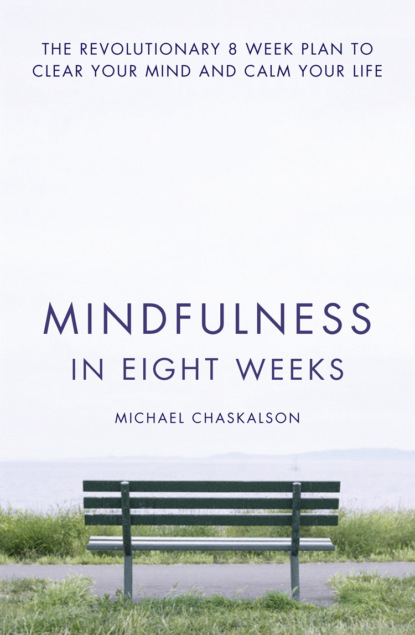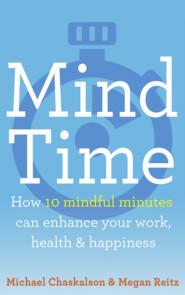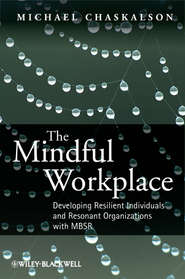По всем вопросам обращайтесь на: info@litportal.ru
(©) 2003-2024.
✖
Mindfulness in Eight Weeks: The revolutionary 8 week plan to clear your mind and calm your life
Автор
Год написания книги
2019
Настройки чтения
Размер шрифта
Высота строк
Поля
Be aware of sound, of texture, of flavour and of change.
Keep chewing in this way, very slowly, until there is almost nothing left to chew.
9. Swallowing
When there is almost nothing left to chew, swallow. See if you can be aware of the intention to swallow as it first arises.
10. Finishing
Follow what is left of the raisin as it moves down towards your stomach and you lose sight of it altogether.
How does your body feel now as you’ve completed that exercise?
What did you notice that you might not have been aware of before?
There’s no telling what you will find when you do this exercise. We’re all different and we all come to the process with our own unique histories and ways of seeing. What’s really important here is that you allow your experience of doing that exercise simply to be what it was – there is no right or wrong way of doing it. What’s really key is that you notice and reflect on what you actually experienced. What was it like, in detail, for you?
You might want to spend a few moments now turning the experience over in your mind. What did you notice as you went through the exercise? If nothing much comes to mind, here are some things you might want to consider:
What struck you most about the exercise?
How did the raisin feel on your palm?
What did you notice as you examined its colour and shape?
What did you notice when you explored it with your fingers?
And when you looked at it more closely?
Was there any aroma? What was that like?
How did it feel in your mouth?
Were you aware of any impulses as the raisin sat between your back teeth before you began to bite and chew?
If there were, what was it like to sit with an impulse and not act on it?
What was the first bite like?
And the second?
How did it sound as you chewed?
How did it taste?
What did it feel like, eating a raisin so slowly?
Anything else?
This isn’t an exercise in trying to remember the details of the exercise. It’s more about just noticing what you noticed.
Some people find the experience deeply enjoyable. ‘I never knew what a raisin tasted like before!’ Others find it unpleasant: ‘I thought I enjoyed raisins, but actually I discovered that I really hate the taste of them – the skin was really bitter. I just never noticed that before.’ Sometimes people say the opposite: ‘I don’t like raisins, and I wasn’t looking forward to this at all, but that wasn’t bad at all. In fact I quite liked it.’ Some people comment on the shape, or the touch, or the colour, or how the smell evokes early memories. Some people find that their mind just keeps wandering off to think of other things – maybe things sparked off by elements of the experience. Some people find that they don’t experience very much at all.
We have such different experiences – some pleasant, some unpleasant. But whether it’s pleasant or unpleasant, whether there’s a lot of experience or very little, whether you stayed focused on the experience or your mind kept wandering off is neither here nor there in this context. This exercise is just about noticing what you experienced.
Most of the time, when we eat a raisin we do it on a kind of automatic pilot. We can eat raisins by the handful even – while we’re also watching television, or getting the kids ready for school, or driving, or having a conversation and so on – and we don’t notice what they feel like in our hands, what they look like, smell like or taste like.
We miss these things, but we get by. As humans, we’ve got this extraordinary capacity to do sometimes even quite complex things on automatic pilot, without needing to notice what we’re doing much.
Have you ever driven 30 miles down the road and then suddenly asked yourself ‘How did I get here?’ Most drivers have had that experience. Sometimes it’s as if we’re driving completely on automatic pilot. That really is extraordinary because, when you think about it, driving a car is a potentially lethal activity. If you are driving on a motorway, in the central lane say, at 70 miles per hour, there might be huge trucks thundering along on the inside lane at 60 miles per hour and powerful cars hurling past in the outside lane at 80 to 100 miles per hour. One twitch of the steering wheel in either direction and you’d maybe die and certainly cause mayhem. Yet you can do it completely automatically, all the time thinking, planning, dreaming or imagining – barely showing up for the journey. We do this, and we don’t find complete carnage on our motorways. Human beings are really good at automatic pilot.
When you first began to drive a car you couldn’t do that. At first, it’s all very clunky and you certainly can’t do much thinking about a complex piece of work that you have to get ready for next week when you’re still trying to figure out, in real time, which of those pedals is the clutch and which the brake. You probably couldn’t even have had a light conversation while you were first trying to do that. But in time you automate all of the driving routines and off you go. You can now drive more or less automatically and your mental resources are freed up for other things.
Automatic pilot extends your capacity by creating habits and habitual behaviours that take fewer brain resources than conscious ones do – and this is a wonderful capacity. We get through our days by running a huge series of automatic routines.
For example, like most people, my wife and I have our ‘turning in for the night’ automatic routine. At some time, usually between 10.30 p.m. and 11.30 p.m., we decide it’s time to turn in and off we go – turn off the television, turn off the heating, check the back door is locked, check the cat is in, lock the front door, up the stairs, brush teeth ... and so on.
We don’t give it a thought. We don’t suddenly go ‘Oh my gosh! It’s time to go to bed. What shall we do? Where to start? I know – the back door. You check the back door and I’ll ... I’ll check the front door. Right. Done. Now what? Oh yes, the television. I’ll do the television – you do the heating. Great! Done. Now ... Cat. Where’s the cat ...?’
None of that. We just run our normal turning in for the night routine, and we have hundreds, maybe thousands of these that get us through the day.
That’s great, but there are a few problems.
On Automatic Pilot We Miss Things
When you’re on automatic pilot you can miss things. Some of what you miss can really enrich your life. Those few moments between your home and the train station in the morning, when you might have tuned in to the quality of the light or a sense of welcome freshness in the air. But you missed it because you were running your ‘thinking about my to-do list’ routine on automatic pilot – maybe already for the tenth time that morning.
In ways like this you miss so much that can enrich your life and in simple ways enhance the quality of your days – and your life. The first few buds in spring, a cobweb catching the light, the sound of a bird, the taste of a melon. They take hardly any time, but when you miss such things your life is just a tiny bit impoverished – and these things add up. When you catch them, in simple and easy ways your life gets richer and richer.
Some of what you miss can be really important. That look in a child’s eye in the morning that might have told her mum that she was being bullied at school and didn’t want to go. But her mum missed it because she was just running her familiar ‘family breakfast’ routine on automatic pilot and not paying attention. Or that tone of voice in a colleague’s greeting in the morning that says he’s got real problems at home that he really needs to talk about as they’re affecting his work. But you miss it because you’re just doing your ‘arriving at work’ routine on automatic pilot.
So, although the capacity to do things on automatic pilot is really important and valuable, it’s also sometimes really important to come out of automatic pilot – to consciously show up for your life. A life lived mainly on automatic pilot is poorer and less effective than it might be. In some ways it’s barely a life at all.
And there are other issues as well.
Our Automatic-Pilot System can Become Overloaded
Running an automatic-pilot routine can be like opening a new window in a computer. That can be an efficient way of getting things done. But sometimes you can have too many windows open, too many routines running, and then the computer starts to slow and may even eventually crash. There’s just too much going on, too many conflicting routines running.
At work, for example, you begin to feel overwhelmed as yet another email pings into your inbox, while you’re speaking to a colleague who dropped in with an urgent request, as you were trying to work out what to do about that piece of work from last week that ran over deadline and wondering how your partner would take it if you cancelled yet another evening at home together ...
Sometimes you need to consciously come out of automatic pilot and choose to focus – but in a particular way.
At such times, it can be unhelpful to try to think your way out of the problem. That would be like opening yet another window on a computer that’s already running slowly and may be about to crash. Instead, you need to shut down some of the windows and allow your mental and emotional resources to engage with just one thing.
Mindfulness training helps you to spot when you’re overloaded before things start going wrong. It helps you to come away from automatic routines and focus more effectively on each simple passing moment.
Some of Our Automatic Routines can be Really Unhelpful







